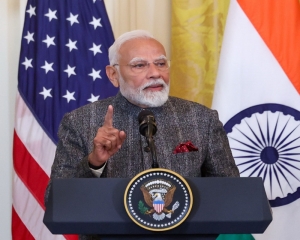After the India Meteorological Department (IMD) and the Indian Institute of Tropical Meteorology (IITM) forecasted that Delhi’s air quality is likely to deteriorate and fall into the “very poor” category on October 23 and 24 due to unfavorable meteorological and climatic conditions, the Commission for Air Quality Management (CAQM) invoked Stage 2 of the Graded Response Action Plan (GRAP).
They directed authorities in the National Capital Region to increase parking fees to discourage private transport and to enhance CNG or electric bus and metro services.”
Meanwhile, the minimum temperature in Delhi was recorded at 15.8 degrees Celsius on Saturday, three notches below the season’s average, while the city registered air quality in the “poor” category.
The sub-committee for operationalisation of the Graded Response Action Plan (GRAP) of the Commission for Air Quality Management in NCR & Adjoining Areas (CAQM) has urged people to use public transport and minimise use of personal vehicles, use technology, take less congested route even if slightly longer, regularly replace air filters at recommended intervals in your automobiles, avoid dust generating construction activities during months of October to January and avoid open burning of solid waste and bio-mass.
Delhi’s 24-hour average air quality index (AQI) stood at 248 on Saturday. The national Capital registered PM 10 levels at 161 and PM 2.5 levels at 82.
Accordingly, the Sub-Committee for operationalisation of the Graded Response Action Plan (GRAP) of the Commission for Air Quality Management in NCR & Adjoining Areas (CAQM) met on Saturday to take stock of air quality scenario of Delhi-NCR.
At a meeting to review the air quality situation in the Delhi-NCR, the CAQM a statutory body responsible for proactively implementing GRAP, said forecasts by the India Meteorological Department (IMD) and the Indian Institute of Tropical Meteorology (IITM) suggest Delhi’s overall air quality is likely to dip and enter the ‘very poor’ category on October 23 and 24, owing to unfavourable meteorological and climatic conditions.
The panel therefore decided to invoke the measures under Stage II of GRAP in the entire NCR in addition to steps already taken under Stage I. “All actions as envisaged under Stage-II be implemented in right earnest by all the agencies concerned in NCR with immediate effect, in addition to all Stage-I actions of GRAP already in force,” it said in an order.+
The CAQM also advised to carry out mechanical/ vacuum sweeping and water sprinkling of the identified roads on a daily basis and to ensure water sprinkling along with use of dust suppressants (at least every alternate day, during non-peak hours) on roads to arrest road dust especially at hotspots, heavy traffic corridors, vulnerable areas and proper disposal of dust collected in designated sites/landfills. The CAQM reiterated its October 31 deadline for National Capital Region (NCR) states to phase out older buses running below the BS-VI benchmark. It stated that from November 1 onwards, only electric, CNG-run and BS-VI buses will be allowed to ply within the NCR districts or to and from Delhi.
According to data from Central Pollution Control Board , Jawaharlal Nehru Stadium recorded an AQI of 190 which falls in moderate category. CRRI Mathura Road station recorded moderate air quality with AQI of 152. ITO station recorded an AQI of 191 which falls in moderate category. Mandir Marg station recorded moderate air quality with an AQI of 176. Poor air quality was recorded in areas like Burari with AQI at 275, Dwarka Sector-8 recorded 251 AQI, Jahangirpuri recorded 263 AQI , Rohini recorded 247 AQI while Wazirpur station recorded an AQI of 235.Anand Vihar station also recorded poor air quality with an AQI of 239 according to CPCB.
GRAP categorises actions into four stages: Stage I – ‘Poor’ (AQI 201-300); Stage II – ‘Very Poor’ (AQI 301-400); Stage III – ‘Severe’ (AQI 401-450); and Stage IV – ‘Severe Plus’ (AQI >450).
Authorities are also tasked with enforcing a complete ban on the use of coal and firewood in ‘tandoors’ at hotels, restaurants and open eateries, along with taking punitive action against polluting industrial units and thermal power plants within 300 kilometres of Delhi.
Ensuring the proper implementation of guidelines for dust mitigation at construction and demolition project sites and sound environmental management of resulting waste is also part of Stage I.
Stage II measures involve increasing parking fees to discourage private transport and enhancing CNG or electric bus and metro services by introducing additional fleets and increasing service frequency.
Under Stage III, BS-III petrol and BS-IV diesel four-wheelers are prohibited from operating in Delhi, Gurugram, Faridabad, Ghaziabad, and Gautam Buddh Nagar.


























